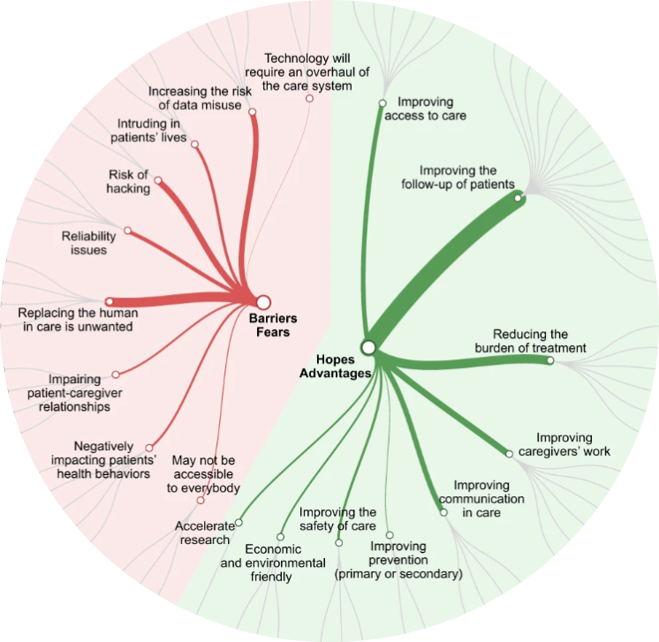Digital & Innovation
Patients’ views of wearable devices and AI in healthcare

Wearable biometric monitoring devices (BMDs) and artificial intelligence (AI) enable the remote measurement and analysis of patient data in real time. These technologies have generated a lot of “hype,” but their real-world effectiveness will depend on patients’ uptake.
In this recent study, the largest and most comprehensive view of chronic patients’ perspectives of the use of these technologies in healthcare, the authors report two experiments to document the perception of patients with chronic conditions on the use of BMDs and AI in care. 50% of patients felt that the development of digital tools and AI in healthcare was an important opportunity and 11% considered it a danger. In particular, patients feared that the misuse of technology would lead to unwanted replacement of humans and threaten the humanistic aspect of health and care.
In the second part of the study, the authors showed that 35% of patients would refuse to integrate at least one existing or soon-to-be available interventions using BMD- and AI-tools in their care. In addition, only a minority of participants were ready to integrate fully automatic AI-based tools in their care.
The results highlight that patients intuitively think that AI should help clinicians “predict” outcomes, but that decisions, actions, and recommendations should remain a human task. Technology would be like a “driver assistance” for clinicians. Even among patients who were the most ready for the use of technology in their care, they would only see AI as a complement—and not as replacement—for human care for situations related to sensitive topics (cancer) or which involved lasting interventions (monitoring for chronic conditions).
The number of studies evaluating new BMD- or AI-based tools is rapidly increasing and their costs are decreasing. The current literature focuses on the technological aspects of these tools but neglects patients’ perspectives of their use in healthcare.
In this paper, the authors showed that most patients would agree to use these new technologies in their care if controlled by human caregivers. These findings call for a novel reflection about how technology should be integrated in care processes to avoid a negative impact on patient care, the generation of unnecessary burdens or the intrusion in their lives.

News & Trends - MedTech & Diagnostics

Stryker partners with local researchers to advance shoulder joint surgery
MedTech & Diagnostics News: Joint replacement is a commonly performed major surgical procedure that has considerable success in alleviating pain […]
MoreNews & Trends - Pharmaceuticals

Over two-thirds of Aussies missing healthcare appointments
Pharma News: Over 70% of Australians have postponed or cancelled healthcare appointments in the last 12 months. The primary reason […]
MoreNews & Trends - Pharmaceuticals

Opposition decries incremental change as New Zealand government defends Pharmac budget
Pharma News: New Zealand’s Associate Health Minister has made headlines by unveiling Pharmac’s largest ever budget of $6.294 billion over […]
MoreMedical

Telehealth’s 10-year leap in 10 days: Reshaping hospital EDs
Medical: As overcrowding and ramping continue to challenge emergency departments across Australia, the concept of virtual emergency departments (EDs) emerges […]
More